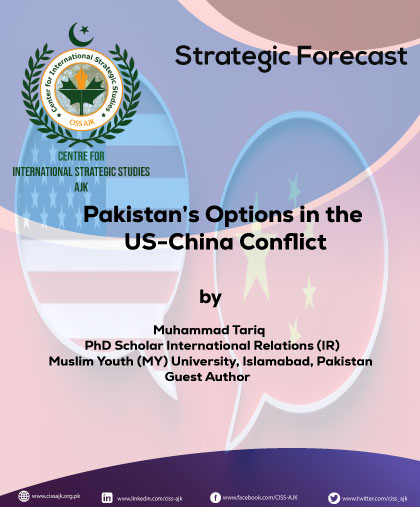With the US-China rivalry growing in the region diplomatic efforts like the recent visit of US foreign minister Mr. Blinken are aimed at retaining normalcy. Pakistan is running out of options. Pakistan is pushed by the developments, towards making a clear policy decision. Pakistan is facing the dilemma of choosing among two super powers that are equally important in the context of its national security and economic interests. Making and aligning with a particular actor in the game is a difficult decision and will require enough brain storming by the policy makers.
Pakistan is diplomatically connected to both the powers since its very inception and Pakistan so far has played a balanced role between the two powers. Pakistan has played a bridging role between the two in the 70s. When President Yahya Khan facilitated contacts between Henry Kissinger the then US Secretary of State for Foreign affairs and the Chinese Premier Chu Enlai. Considered as the most important contact between the two super powers in the Cold War era.
Pakistan cannot remain indifferent to developments in the region, on which hinges its national security interests. Pakistan is facing the challenge of securing its interests in a charged environment where super powers are dagger drawn. Pakistan can play a bridging role which it has done it in the past and can do it now as well. Pakistan can create an enabling environment for peaceful resolution of the crisis.
Firstly an arbitrator’s role cannot be ruled out for Pakistan. Given the high esteem in which Pakistan is held by both the players and its strategic importance in the region. Pakistan is important for both the US and China for economic and security reasons. Cognizant of the fact Americans won’t resort to policies that may alienate Pakistan and its resultant alignment with China. Pakistan’s role and its relationship with the Taliban government has a direct bearing on regional stability especially in the efforts of rebuilding Afghanistan both politically and infra structurally.
Secondly the resolutions of conflicts like the Kashmir issue between two nuclear neighbors which poses a constant threat to regional stability is a matter concern to both China and the US. Convincing flows from the existence goodwill. If prior goodwill does not exist and mistrust is the result then coming to terms becomes difficult, leading to aggravating circumstances rather than mitigating circumstances.
Thirdly with terrorism still high on the global governance agenda. Pakistan’s support on counter terrorism strategies will be instrumental. Both the Us and china will look towards Pakistan for finding a solution.
Fourthly Pakistan’s ongoing strained relations with the International Monetary Fund (IMF) offering unending conditionalties for extending help, the use of US influence is looked upon by the Pakistani public, as decisive.
Fifthly increasing India’s capability cannot be at the cost of strategic imbalance of South Asia. Prime Minister Modi ‘s visit to the US and the US agreeing to transfer air defense technology will surely disturb the strategic balance. Compelling Pakistan to move towards China whose historic support to Pakistan is exemplary.
Sixthly, an economically and militarily strong and socially stable Pakistan is in the interests of the US itself. Alienating Pakistan at such a crucial moment will surely jeopardize US interests in the region.
For China Pakistan has remained and will remain high on its economic and security policies agenda. The success of its Belt and Road initiative (BRI) and the China Pakistan Economic Corridor (CPEC) is directly linked to Pakistan’s support. Pakistan has extended all out cooperation in this regard. Chinese have expressed their willingness to address the debt issue of Pakistan..
The BRI being a multi-national development project will extend into Afghanistan as well. With the Taliban’s government remaining unrecognized by the international community entry into binding international contracts will not be possible. Pakistan’s role will be instrumental given Pakistan’s engagement with the Taliban’s government on issues of human rights, women’ rights, female education, and social sector development projects.
Chinese historically have balanced any imbalance created by US favors for India in the region..
China apparently qualifies for Pakistan’s favor in the crisis. But Pakistan’s choice needs to be cautious and based on realism. Given the recent diplomatic proximity between the US and India choosing US is not viable. Pakistan’s choosing china cannot be the at cost US-Pakistan relations which in its own self are historically important for both despite mistrusts and doubts.
Pakistan needs US support on many global issues like security, climate, economy, terrorism and its influence with the International Financial Institutions. Above all is the US support on Kashmir. Recognition of Taliban’s government in Afghanistan, having economic and security implications for Pakistan will condition Pakistan’s decision.
Chinese historically have been pragmatic in view of the security dilemma of Pakistan. . They have based their support on their strategic interests rather than the nature of US-Pakistan relations. Pakistan should adopt a calculated approach based on its national security interests keeping both the super powers in good humor. Pakistani policy makers will have to consider the short and long term fallout of their decision.
Writer is
PhD Scholar International Relations (IR) at
Muslim Youth (MY) University, Islamabad, Pakistan


